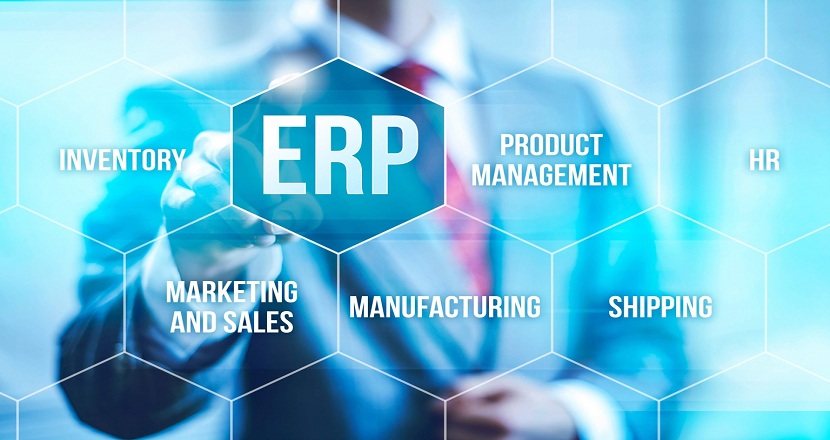Introduction
-
Navigating the Competitive Landscape
In the dynamic business environment, enterprises constantly seek avenues for a competitive advantage. The strategic adoption of cloud-based mobile ERP solutions becomes paramount in navigating this landscape, offering a pathway to operational excellence and profitability.
-
Gartner’s Projections
Gartner’s foresight underlines the urgency for organizations to embrace fourth-era ERP applications, with a staggering 65% projected adoption by 2023. The compelling need for enhanced flexibility, scalability, and financial gains underscores the significance of staying abreast of technological evolution.
Significance of Mobile ERP Solutions
- Unleashing the Power of ERP
ERP serves as a linchpin in optimizing core business functions, driving efficiency, productivity, and overall growth. The infusion of mobility features elevates these benefits, empowering businesses to disrupt traditional norms and operate with heightened agility.
- Adapting to the Modern Business Landscape
In the contemporary business milieu, mobile ERP applications have evolved into indispensable tools, particularly with the prevalence of remote work and globally dispersed teams. These applications facilitate enhanced visibility, providing real-time access to critical ERP functions through any mobile device, thereby fostering adaptability.
Types of Mobile ERP Software for Custom Businesses
- Tailoring Solutions to Unique Needs
Delving into diverse mobile ERP solutions designed for specific business requirements is essential. Examples encompass Marketing Automation for efficient campaign management, Enterprise Resource Planning for organized employee planning, Customer Relationship Management for enhanced customer interactions, Automated Billing for streamlined invoicing, Message and Collaboration Systems for improved communication, Email Marketing for targeted outreach, Integrated Workforce Management for efficient task execution, and HR Management for streamlined human resource processes. These varied solutions showcase the adaptability of mobile ERP to diverse business needs.
Benefits of Mobile ERP for Modern Businesses
- Elevating Operational Efficiency
Mobile ERP systems go beyond optimizing processes; they revolutionize how businesses operate by efficiently allocating resources and saving valuable time. The intuitive and user-friendly nature of these systems ensures quick access from any device, enabling faster decision-making and significantly boosting overall productivity. Businesses embracing mobile ERP witness a transformative impact on their operational efficiency and agility.
- Ensuring Data Security
Mobile ERP systems provide a robust defence against potential threats through their cloud-based architecture. The emphasis on encryption and authentication measures not only safeguards sensitive business information but also instils confidence in organizations regarding the confidentiality and integrity of their data. In an era where data breaches are a constant concern, mobile ERP systems offer a secure fortress for critical business information.
- Expanding Data Accessibility
The empowerment of businesses to access critical data from any location is a hallmark of mobile ERP systems. This accessibility ensures real-time decision-making capabilities, allowing organizations to monitor customer orders, track inventory levels, and access sales data promptly. By enhancing responsiveness, businesses can elevate customer satisfaction, contributing to sustained success in a competitive landscape.
- Increasing Productivity
Mobile ERP application development introduces a paradigm shift in productivity. By automating routine tasks and streamlining processes, these applications significantly reduce the steps required to complete various functions. This efficiency boost translates into more time dedicated to meaningful tasks, fostering a culture of continuous improvement and innovation within the organization.
- Minimizing Paperwork
As businesses transition from traditional paperwork to digitization, mobile ERP solutions play a pivotal role in simplifying data management. This move not only aligns with environmental sustainability goals but also streamlines operations by eliminating the cumbersome handling of physical documents. The paperwork reduction contributes to a more agile and eco-friendly business environment.
- Faster Onboarding
Mobile ERP apps expedite the onboarding process, providing a seamless introduction for new employees. From document signing to training processes, these apps offer a user-friendly interface that accelerates the learning curve. This efficiency in onboarding not only saves time for HR departments but also ensures that new employees swiftly integrate into the organizational workflow.
- Improved Customer Support
Mobile ERP apps play a pivotal role in enhancing customer support services. By efficiently resolving common issues through the app and directing more complex problems to dedicated staff members, businesses can provide a higher level of service. The accessibility and responsiveness offered by these apps contribute to an overall improvement in the customer experience, strengthening the bond between businesses and their clients.
Features of a Robust Mobile ERP Solution
- Real-Time Data Access
Real-time data access stands as a cornerstone feature in a robust mobile ERP solution. This capability ensures that users can access critical information anytime, anywhere, fostering informed decision-making. The ability to instantly view and update data on the go contributes to enhanced efficiency and agility in managing business processes.
- Workflow Management
Efficient workflow management is a key aspect of mobile ERP solutions. These systems are designed to optimize workflows by providing tools for task management, approval processes, and notifications. Users can seamlessly track and manage tasks, fostering collaboration and ensuring a streamlined operational process.
- Inventory and Supply Chain Management
Mobile ERP solutions provide a comprehensive tool for managing inventory and optimizing the supply chain. Users can efficiently track stock levels, place orders, and monitor the entire supply chain process. This feature contributes to minimizing stockouts, improving inventory management, and enhancing overall supply chain efficiency.
- Sales and Customer Management
The integration of robust features for sales and customer management sets mobile ERP solutions apart. These applications offer functionalities to manage sales orders, customer information, and CRM. Sales representatives can efficiently track sales activities, capture leads, and enhance customer engagement, contributing to increased sales effectiveness.
- Reporting and Analytics
Unparalleled reporting and analytics capabilities are integral to mobile ERP solutions. Users can access custom dashboards to view key performance indicators (KPIs) and gain real-time insights into business performance. This feature empowers organizations to make data-driven decisions and adapt strategies based on actionable intelligence.
- Security and Access Control
Security and access control are paramount in mobile ERP solutions. These apps prioritize data security through robust authentication measures, role-based access controls, and data encryption. These features ensure the confidentiality and integrity of sensitive business information, instilling confidence in users regarding the security of their data.
- Offline Capabilities
Certain mobile ERP solutions offer offline capabilities, enabling users to maintain workflow continuity even without an internet connection. This feature ensures uninterrupted productivity, with data synchronization seamlessly occurring once the device reconnects to the internet. It provides flexibility for users who may find themselves in areas with limited connectivity.
- Requirement Gathering
The requirement-gathering phase is crucial in understanding the client’s specific needs and business objectives. Thoroughly identifying functionalities, features, and integration requirements sets the foundation for a successful ERP mobile application development project.
- Planning and Design
The planning and design phase focuses on defining the app’s architecture and designing user-friendly interfaces. This meticulous planning ensures an optimal user experience, aligning the app with the client’s expectations and industry standards.
- Development
The development phase involves proficient coding of the mobile ERP app’s front-end and back-end components. Developers leverage programming languages, frameworks, and cutting-edge tools to construct a high-performance app that meets the specified requirements.
- Quality Assurance
Quality assurance and testing are pivotal stages to guarantee the seamless functioning of the mobile ERP app. Employing various testing methodologies, including functional, performance, and compatibility testing, helps identify and address any bugs or issues, ensuring a robust and reliable application.
- Deployment
The deployment phase prepares the mobile ERP app for distribution through app stores or enterprise channels. This involves ensuring that the app meets all necessary criteria for a successful launch and is ready for use by the target audience.
- Maintenance and Updates
Continuous maintenance and updates post-deployment are essential for the mobile ERP app’s success. Timely bug fixes, feature enhancements, and compatibility updates ensure that the app remains aligned with evolving business requirements and adapts to changes in the mobile platform landscape. Regular updates contribute to the app’s longevity and continued effectiveness.
Cost Considerations in ERP Mobile Application Development
- Estimating Development Costs
When estimating the cost of building a custom mobile ERP app, it’s crucial to consider factors such as the complexity of the application and the geographical location of development. A rough estimate ranges between $40,000 to $200,000, but this can vary based on specific functionalities and features. Geographical factors also play a role, with development costs differing across regions. For instance, hourly rates in Asia may range from $30 to $40, while in Tier 1 countries like the US, rates can go as high as $100-$120.
- Impact of Tech Stack
The impact of the chosen tech stack cannot be overstated in mobile ERP application development. A well-selected tech stack ensures optimal performance and a seamless user experience. The right combination of programming languages, frameworks, and tools contributes to the app’s efficiency, responsiveness, and overall success. It’s essential to prioritize technologies that align with the project’s goals and requirements, ultimately influencing the app’s functionality and user satisfaction.
- Embracing Digital Transformation
Summarizing the transformative potential of mobile ERP solutions, businesses are urged to embrace digital transformation for sustained growth and competitiveness. Mobile ERP solutions streamline operations, enhance accessibility, and provide real-time insights, positioning enterprises to thrive in the ever-evolving business landscape. The conclusion emphasizes that digital transformation is not just a choice but a necessity for those aspiring to remain at the forefront of their industries.
Conclusion
The conclusion serves as a call to action, encouraging enterprises to explore the transformative capabilities of mobile ERP solutions. It emphasizes the long-term benefits of adopting these solutions, including improved efficiency, heightened data security, and enhanced accessibility. Businesses are urged to recognize the need to adapt to the evolving technological landscape, ensuring they remain agile and responsive to emerging opportunities and challenges. The call to action aims to inspire proactive steps toward integrating mobile ERP solutions into enterprise strategies for a competitive edge.



